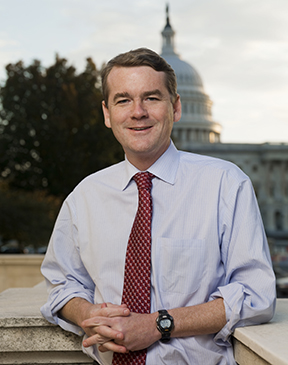By Senator Miichael F. Bennet

For those whose lives have been touched by Alzheimer’s, there’s no need to explain its severity. As the sixth-leading cause of death and the only major disease without a prevention or cure, Alzheimer’s is a tragic fact of life for 6.2 million Americans, including 76,000 Coloradans.
While it has been 115 years since we first diagnosed this disease, I am encouraged by the progress we have made on research on therapies that improve quality of life and on finding that elusive cure.
At a time when we are so divided, the bipartisan support Congress and consecutive administrations have shown for increasing funding for Alzheimer’s research is a bright spot. I have been pleased to support increases in federal funding for Alzheimer’s research since joining the Senate in 2009. Over the past 10 years, the U.S. Government has implemented a more than six-fold increase in Alzheimer’s research funding, from $504 million in 2013 to $3.4 billion this year. In 2021 alone, medical care for people living with Alzheimer’s and other forms of dementia cost our nation $355 billion.
Investing in this research to find a cure and reduce medical care costs is the smartest thing we can do. If we don’t find a cure by 2050, the annual cost of care will top $1.1 trillion.
Over the last few years, we have made exciting progress on research to find the ultimate cure for Alzheimer’s. Right now, there are nearly 400 clinical trials currently in phase one, two or three for Alzheimer’s drugs or devices.
In my own state, the University of Colorado Anschutz Medical Campus is doing landmark research, with Alzheimer’s Association funding, on the drug Leukine which, in trials, has shown potential for cognitive performance improvement in people living with mild to moderate Alzheimer’s.
Researchers at Colorado State University (CSU) are exploring the potential of focusing on the connective tissue in our brains, or white matter, as a way to affect the course of dementia. Another CSU researcher is examining ways to predict how behavioral fluctuations in people in early-stage Alzheimer’s effects their ability to drive.
And University of Denver researchers are exploring links between Alzheimer’s and Down Syndrome, plus how financial decision making might be an early indicator of cognitive decline.
The second heartening research front is an examination of factors that may help prolong cognitive health and delay dementia onset. The Alzheimer’s Association is spearheading groundbreaking research that focuses on population groups deemed at highest risk of developing dementia. The U.S. Pointer Study is examining a range of factors, including diet, exercise, education, socialization and other behaviors that may reduce or delay the potential to develop Alzheimer’s.
Whether we find the ultimate “silver bullet” that cures Alzheimer’s, or we identify behavioral and lifestyle triggers that help us delay the onset of dementia, research is the key to mastering this dreaded disease that steals the essence of our loved ones before taking their lives. For Coloradans, Americans across the United States, and my own family, I am committed to seeing this challenge through to completion.
Alzheimer's Association
The Alzheimer's Association leads the way to end Alzheimer's and all other dementia — by accelerating global research, driving risk reduction and early detection, and maximizing quality care and support. Our vision is a world without Alzheimer's and all other dementia.™ For more information, visit www.alz.org or call the 24/7 Helpline at 800.272.3900.